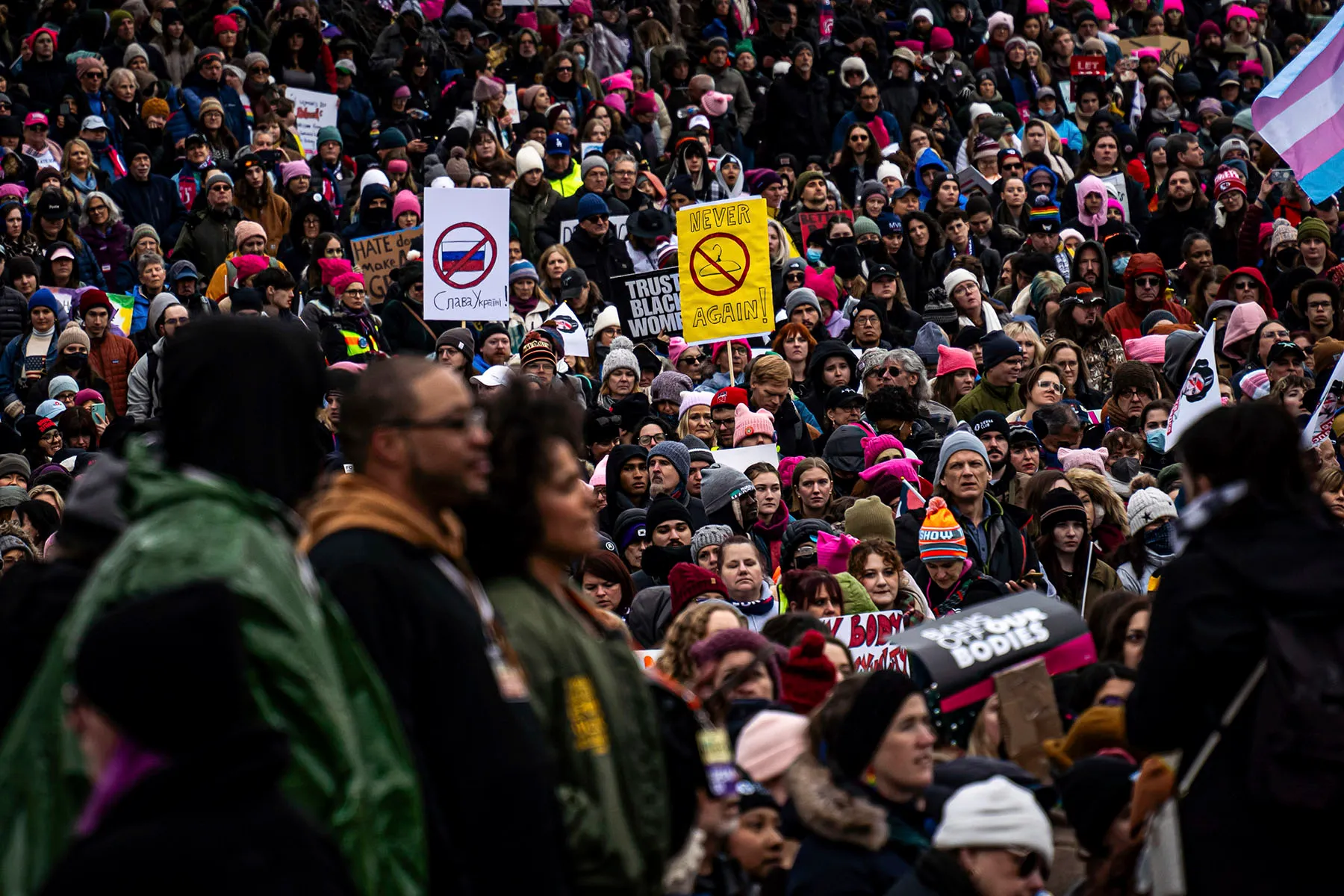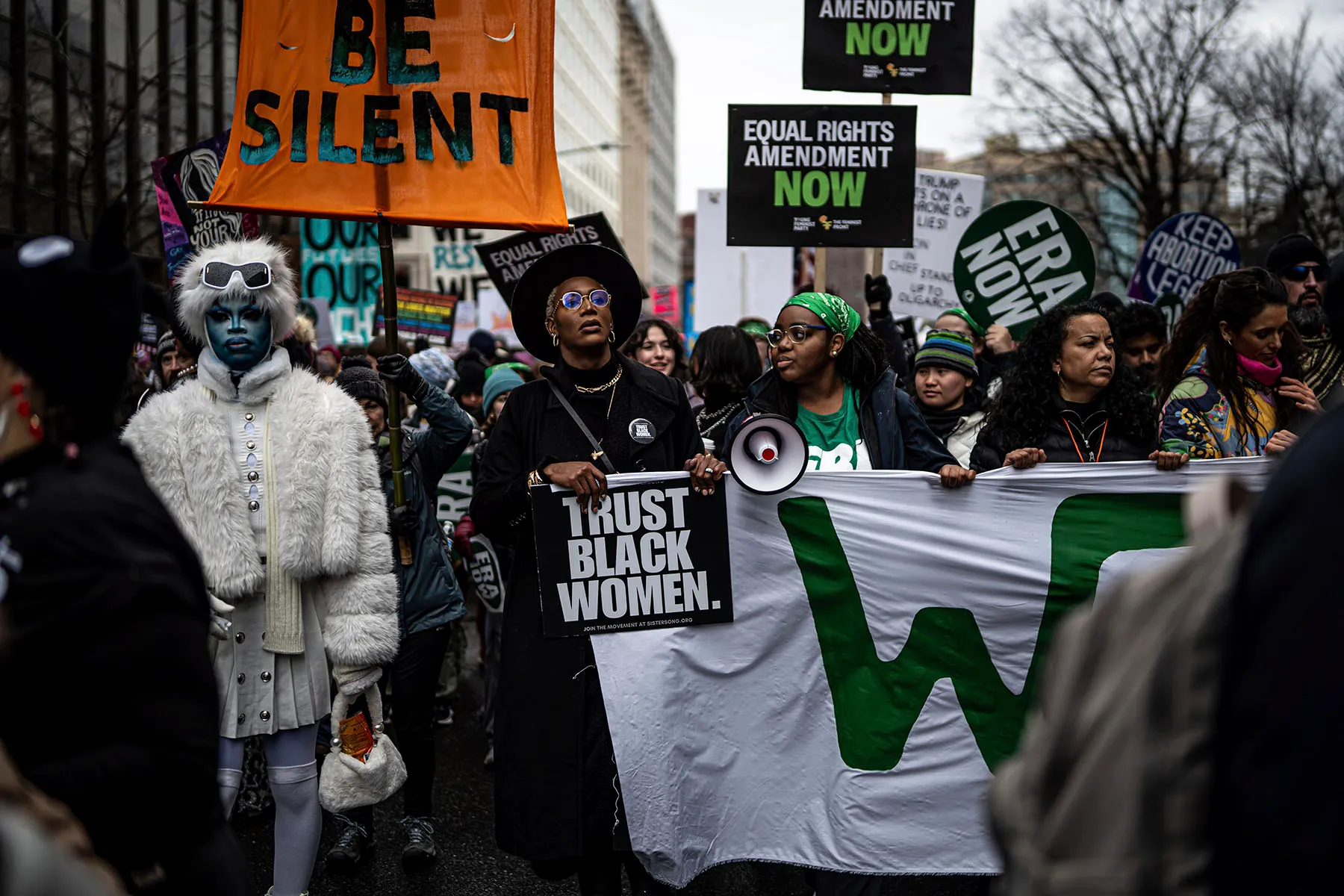When over half a million people gathered for the Women’s March on Washington on January 21, 2017, the day after the first inauguration of President Donald Trump, it was considered to be the largest single-day protest in United States history.
This year, the organizers of the People’s March, some of whom planned the Women’s March eight years ago, weren’t expecting to break records. But, they say, they see the value of bringing people together in a large demonstration. The protest, two days before Trump’s second inauguration, brought crowds to Washington and to local events around the country to have their voices heard on issues including democracy, immigration, gender justice and LGBTQ+ issues. Organizers say more than 50,000 showed up for Saturday’s events in D.C.; some news outlets reported they fell short of that figure though still drew thousands.
Many of the women who showed up eight years ago — angry about Trump’s election, his sexist insults leveraged against the first woman to win a major party’s presidential nomination, the accusations of sexual misconduct against him — didn’t return to Washington this year. They’re still angry, just not all showing it with marches on the National Mall.
“This is not 2017. What this election told us is that people knew exactly what they were voting for when they voted for Donald Trump,” Jara Butler, the chief impact officer at Supermajority, a group that organizes young women who don’t vote in every election around progressive issues, told The 19th.
Simple outrage about Trump holding the presidency was never enough to sustain practical, meaningful change, she said. Black women turned out to vote against him in 2017 — and then showed up for the march. “I’m speaking as a Black woman, but we said this in 2017 when they did the Women’s March. We were like, ‘Hey, we’re here to support you, but we did our job.’” Now, Butler said, she’s thinking a lot about a sign that went viral from the 2017 Women’s March that mentioned the need to talk to the 53 percent of White women who voted for Trump. “I’m constantly saying, ‘I’m not going to justify my humanity to you anymore. Y’all are going to have to argue with yourselves.’”
She said she’s been counseling her team that they need to lead “not from the front, but from the side.”
“I said to our staff that we’re no longer going to talk. We are going to practice active listening and stop telling people what they need and instead ask them what they need.” Young Black women in particular, she said, are “absolutely disillusioned and frustrated and that’s a challenge because we don’t want to lose them.”
Butler said that she thinks the future of progressivism — and the Democratic Party — is going to come from state-level politicians who are making bold moves in their own home communities, not through national-level activist action. There is now a whole new class of down-ballot progressive leaders in state and local government whose runs were inspired by Trump’s election in 2016. The same thing seems to be happening again.
Run for Something, an organization that recruits and supports young progressives to run for public office, has seen over 13,000 people sign up on their site since Election Day 2024, more than signed up in all of 2017, the year the organization was founded. Sara Hadad, Run for Something’s chief strategy officer, told The 19th that of those 13,000, 30 percent are LGBTQ+, 51 percent are women and 72 percent are under 40 — all higher rates than in previous election cycles. Most are interested in running for local office, saying they see those as the first line of defense against federal actions regarding abortion, immigration policy, and education policy.
“The thing that was missing in 2017 that people are now beginning to understand is that it’s all local,” Butler said.
Organizers of this year’s People’s March said changing the name from the Women’s March signaled an interest in big-tent coalition building. For the groups behind the march, including SisterSong, Harriet’s Wildest Dreams and the National Organization for Women (NOW), the headline-grabbing demonstration is just one of several approaches to resistance, all of which are essential to a sustainable movement, they argue.
“There’s power in the community collective so we don’t want to eliminate that,” said Christian Nunes, the president of NOW. “We have to give people something to come together for and feel that collective people power so that they can feel encouraged to continue this long fight that we’re going to have.”
Monica Simpson, executive director of SisterSong, a national reproductive justice group focused on women of color, said Black women are exhausted by the reality that their commitment to pushing for progress on social issues is often met with a resounding rejection from the American electorate. Some are stepping back to prioritize rest and healing during the new Trump administration.

“I do think that that impacts the way that people want to show up in their resistance. I think that has shifted people from wanting to necessarily be in the streets, and these streets are getting worse every single day, at every turn,” Simpson said. “With Donald Trump’s return to office, [conservatives] are so emboldened. We all remember January 6, and so folks are really asking themselves whether they want to put themselves in that level of harm’s way.”
But even with the election frustrations, Black women and other people of color continue to lead efforts to serve communities that may be disproportionately affected by the Trump administration’s policy agenda.
Michigan state Sen. Mallory McMorrow, a Democrat, said that when people ask her if they should be concerned about a lack of groundswell of public action, she reminds them that Trump’s first election inspired a record number of women to run for office — and win — in 2018, including her. The impact of that endures.
“We’re not marching, we’re legislating,” she said.
McMorrow attended the satellite Women’s March in Detroit in 2017.
“I had never really protested before and I was very nervous. I didn’t know what to expect,” she said. She was worried about arrests and pepper spray, but instead found multiple generations of women linking arms and singing. She exchanged numbers with many women she met that day, then started hosting postcard-writing parties at her house. Soon enough, someone suggested that she run for office.
This year, McMorrow plans to spend inauguration day in her district, participating in a day of service being organized by local high schools in honor of Martin Luther King Jr. Day.
McMorrow said the most important thing Democrats can do right now is legislate. “They’re going to be a lot of things over the next four years that are designed to make us respond and fall into a trap where they can accuse us of being angry feminist harpies or whatever it is that they want to make us out to be and I think the strongest thing we can do is say, ‘No, that’s not us,’” she said. “The important thing is to show all voters that we are normal, caring, hard-working people and let the other side make themselves into a caricature.”
Many women are still being activated by Trump’s second election today the way McMorrow was in 2016.
Jennifer Schwert of Marietta, Georgia, didn’t protest during his first administration. But on election night 2024, once it was clear that Trump had won, Schwert began to cry.
“Don’t worry, Mommy. Things on TV aren’t real,” Schwert recalls her 2-year-old daughter — whom she had let stay up late, hoping to be able to show her the election of the first woman president — telling her. “Nothing on TV is real so don’t cry.”
Schwert was trying to get pregnant again and had already experienced multiple miscarriages. As she made sense of Trump’s victory, her immediate concern was for her own health and safety: What would happen to her if she experienced another miscarriage and was unable to receive the medical care she needed because of Georgia’s abortion restrictions? There was also the potential, under the new Trump administration, of more barriers to care.
Initially, she felt numb and helpless. But by the end of the week, she felt she needed to do something. She started a new Facebook group, “Not Going Quietly Women – Metro Atlanta,” hoping to create a space for women to come together and figure out how to make an impact on the local level.
Twenty women of varying races and ethnicities showed up to an early in-person meeting. One was trying to get other women to join her at a board of education meeting. Another had ideas of how to work with a local reproductive rights group. Others were discussing how to best support family members and loved ones who might be impacted by the promised immigration raids planned for post-inauguration.
The group’s members — now close to 200 — want to maximize impact in their own backyard. They have a series of in-person meetings planned for the first 100 days of the Trump administration and are assembling a directory of members, their policy interests and what skills they can lend to organizing efforts.
It’s a need that Butler said she also sees right now.
“We need to get back to community. I think people are hungry for that,” Butler said. “We can’t just walk away. Government is about us. Democracy is not a spectator sport.”





